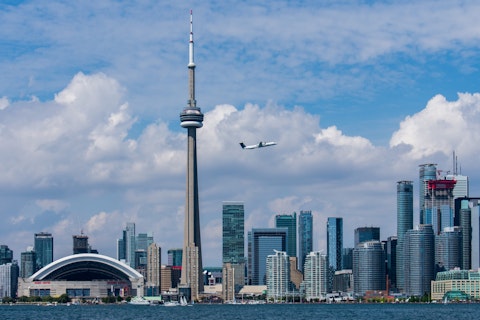In this article, we take a look at the best places to retire in Canada on a budget. You may skip our full list by proceeding directly to The Best Place to Retire in Canada on a Budget.
When most individuals think of retirement, they perceive it as the idea of working till they are in their mid-sixties before drawing the curtains on their professional journey and stepping into a life of leisure. However, lately, this notion of retirement has become less appealing, especially to those who are over 2 decades away from retirement. According to Wealthsimple Inc., 74% of Canadians between the ages of 24 and 44 say that this conventional approach to retirement is an outdated concept. Instead, these individuals would prefer to retire much earlier in the hopes of pursuing other professional and personal aspirations during their retirement. In fact, Wealthsimple reports that 41% of individuals in their sample are motivated to retire before the age of 55, roughly 10 years earlier than the average age of retirement in Canada. One method to achieve such a swift retirement could be with a method referred to as FIRE.
Financial Independence-Retire Early
FIRE, or Financial Independence-Retire Early, is a movement that encourages individuals to resort to an extremely frugal lifestyle during the initial phase of their career in the hopes of retiring early and gaining financial independence. Shopify Inc. (NYSE: SHOP) reports that the movement gained momentum in the US around the start of the pandemic. Moreover, a 2020 survey by Shopify Inc. (NYSE: SHOP) found that 9% of non-retired adults in the US reported they were actively pursuing FIRE.
Unfortunately, such an audacious route towards retirement might not be for everyone. FIRE is highly skewed towards a certain demographic which Shopify Inc. (NYSE: SHOP) describes as single, millennial men in a high-earning bracket. Thus, for those living outside of this particular demographic, the ambition of an early & comfortable retirement might be nothing more than a pipe dream. To make matters worse, recent studies by the Bank of Montreal (NYSE: BMO) show that since the pandemic, even those pursuing a conventional career path might struggle to cope with the financial challenges of retirement.
Retirement Struggles in Canada
According to the Bank of Montreal (NYSE: BMO), Canadians now believe that they need $1.7 million to fund the retirement they expect. In the case of millennials, the figure is even higher. Core-working-age millennials believe they require $2.1 million to be able to secure their retirement, per the Bank of Montreal (NYSE: BMO). These sums are the consequence of a rapid rate of inflation and significant increases in the cost of living all over the country, as revealed in a 2023 survey by The Toronto-Dominion Bank (NYSE: TD).
The Toronto-Dominion Bank (NYSE: TD) reports that 71% of Canadians cited a high cost of living and inflation as a challenge that made accomplishing their financial goals more difficult in the preceding year. Similar findings were reported by The Bank of Nova Scotia (NYSE: BNS), who revealed that 55% of Canadians believe their retirement plans have been impacted by current economic conditions. Consequently, The Toronto-Dominion Bank (NYSE: TD) reports that 43% of Canadians are not confident they will be able to retire when they initially planned.
The idea of delaying retirement isn’t anything new, and given the current economic pressures, it might actually be the smartest decision. The extra income obtained by extending one’s career can help cater to long-term needs that aren’t considered during retirement planning. According to Rebekah Young at The Bank of Nova Scotia (NYSE: BNS), it is time to rethink retirement and to be mindful of the financial impact of long-term care needs.
“Less than one-in-three Canadians consider long-term care needs, though only one-in-ten have actually set aside funds to pay for it…. Even modest out-of-pocket expenses to support aging in place would quickly overwhelm most households.”
– Rebekah Young, Head of Inclusion and Resilience Economics, The Bank of Nova Scotia (NYSE: BNS)
A recent report by ClearBridge Investments highlighted how The Bank of Nova Scotia (NYSE: BNS) was among the best individual stocks in terms of contributions to absolute return during Q1 2024. BNS shares have gained value since October 2023, closing April with a forward P/E ratio of 9.53, a 7.3% YoY increase. In general, Canadian dividend stocks have fared well in the market this year, with 9 out of 11 sectors posting positive returns.
While we at Insider Monkey recognize the stability and potential of BNS stocks, we strongly believe that AI stocks hold greater promise for delivering higher returns and doing so within a shorter time frame. By checking out our report on the cheapest AI stock you can obtain our insights on an investment that has the potential to secure you a 10,000% return over the next decade.
As Canadians consider the possibilities of early or late retirement, it is also important to consider geographical factors that can have a profound impact on retirement expenses. Our lists of best and worst places to retire in Canada are incredibly insightful in this regard. However, for those wondering where is the most economical place to retire in Canada or what is the best place to retire in Canada income-wise, join us as we look at the best places to retire in Canada on a budget. Alternatively, you may check out some of the warmest and cheapest places to live in Canada by perusing our lists on Ontario and British Columbia.

15 Best Places to Retire in Canada on a Budget
Methodology
To develop our list of the best places to retire in Canada on a budget, we initially picked out the most recommended places to retire in Canada on a budget on the Internet. We used 10+ sources including our list of Best Places to Retire in Canada, Best Places to Retire in BC (British Columbia) on a Budget, and Best Places to Retire in Ontario to develop a shortlist. Further research was narrowed down to these places only. Among these best places to retire in Canada on a budget, we developed a scorecard using metrics such as livability scores, cost of living, average rent, and median home prices. Livability scores were sourced from Area Vibes while median home prices were obtained from Houseful.ca and WOWA.ca. The average rent was obtained from Zumper and Rentals.ca. By standardizing these metrics on a linear scale, each place was scored, based on which we sorted our list in descending order. The top 15 places were chosen as the best places to retire in Canada on a budget.
At Insider Monkey we are obsessed with the stocks that hedge funds pile into. The reason is simple: our research has shown that we can outperform the market by imitating the top stock picks of the best hedge funds. Our quarterly newsletter’s strategy selects 14 small-cap and large-cap stocks every quarter and has returned 275% since May 2014, beating its benchmark by 150 percentage points (see the details here).
Here are 15 Best Places to Retire in Canada on a Budget.
15. Halifax, Nova Scotia
Insider Monkey Score: 13.10
Livability Score: 84
Median Home Price: $685K
Average Rent: $2,400
IM Cost of Living: 104.8
Halifax is the provincial capital of Nova Scotia and one of Canada’s most important commercial ports. In comparison to much of the country, Halifax offers a variety of seasons and plenty of waterfront communities. Median home prices in the city are $685K, 7% lower than the national average.
14. St. Catharines, Ontario
Insider Monkey Score: 13.11
Livability Score: 87
Median Home Price: $662K
Average Rent: $1,799
IM Cost of Living: 104.0
Located just 30 minutes away from Niagara Falls, St. Catherines is adorned with lush greenery, vast hiking trails, and picturesque parks. Housing and living costs are much lower than in most of Ontario, while there are plenty of opportunities for travel and adventure, with its proximity to the US border being an added benefit.
13. Calgary, Alberta
Insider Monkey Score: 13.19
Livability Score: 85
Median Home Price: $629K
Average Rent: $2,000
IM Cost of Living: 113.2
Calgary is one of the best places to retire in Canada on a budget as it offers an impressive combination of affordability and recreation. The Rocky Mountains provide a perfect backdrop to the city’s skyline. Calgary is famous for being a cultural melting pot steeped in Western influence that subtly blends in with numerous other cultures being represented in the city.
12. Prince George, British Columbia
Insider Monkey Score: 13.55
Livability Score: 65
Median Home Price: $387K
Average Rent: $1,400
IM Cost of Living: 96.0
British Columbia is considered the most expensive province in Canada, however, Prince George is an exception to that observation. Median home prices are just $387K, and with access to over 100 parks, 6 skiing locations, and the University Hospital of Northern British Columbia, it is one of the best places in Canada to retire on a budget.
11. Saskatoon, Saskatchewan
Insider Monkey Score: 13.56
Livability Score: 73
Median Home Price: $390K
Average Rent: $1,410
IM Cost of Living: 102.8
Saskatoon is one of the best places to retire in Canada if you’re interested in exploring the great outdoors. The city is home to the Wanuskewin Heritage Park which features 20 archeological sites that were once inhabited by the First Nations people. Housing costs in the city are quite affordable, although the cost of living is 2.8% higher than the national average.
10. Montreal, Quebec
Insider Monkey Score: 13.64
Livability Score: 89
Median Home Price: $600K
Average Rent: $1,850
IM Cost of Living: 102.5
Among Canada’s large metropolitans, Montreal is the best place to retire on a budget. Housing costs in the city are much lower than those in Vancouver, Ottawa, or Toronto. Moreover, its myriad of sports events and cultural festivals that take place all round the year are the best way to enrich your golden years.
9. Parksville, British Columbia
Insider Monkey Score: 13.72
Livability Score: 81
Median Home Price: $719K
Average Rent: $2,189
IM Cost of Living: 99.0
Parksville is referred to as the retirement capital of British Columbia. It is located on Vancouver Island, facing the Strait of Georgia, and offers access to several beautiful beaches and parks. Although home prices in the city are the most expensive on our list, there are plenty of retirement communities that offer affordable and comfortable rental solutions.
8. Charlottetown, Prince Edward Island
Insider Monkey Score: 14.96
Livability Score: 80
Median Home Price: $464K
Average Rent: $2,100
IM Cost of Living: 83.5
Charlottetown is regarded as the birthplace of Canada and its historical significance continues to be embellished throughout the city. Apart from landmarks such as St. Dunstan’s Basilica, residents can visit the island’s red-sand beaches. Charlottetown has the lowest cost of living out of all the places on our list, making it one of the best places to retire in Canada on a budget.
7. Edmonton, Alberta
Insider Monkey Score: 15.04
Livability Score: 84
Median Home Price: $437K
Average Rent: $1,500
IM Cost of Living: 97.0
Edmonton is the capital of Alberta and is particularly revered for its arts and culture scene. It has been dubbed as the festival city as it hosts over 50 festivals annually, themed towards sports, film, music, and even pride celebrations.
6. Windsor, Ontario
Insider Monkey Score: 15.21
Livability Score: 87
Median Home Price: $500K
Average Rent: $1,525
IM Cost of Living: 95.7
Located across the border from Detroit, Windsor is one of Ontario’s most affordable destinations. It offers an impressive riverscape and the chance to enjoy the best amenities on either side of the US-Canada border.
5. Winnipeg, Manitoba
Insider Monkey Score: 15.34
Livability Score: 86
Median Home Price: $407K
Average Rent: $1,609
IM Cost of Living: 95.4
Winnipeg is a bustling city that also happens to offer access to some of Canada’s best lakes, forests, and prairies. Apart from its scenic attractions, it hosts events such as the Festival du Voyageur, the Winnipeg Folk Festival, and Folklorama.





